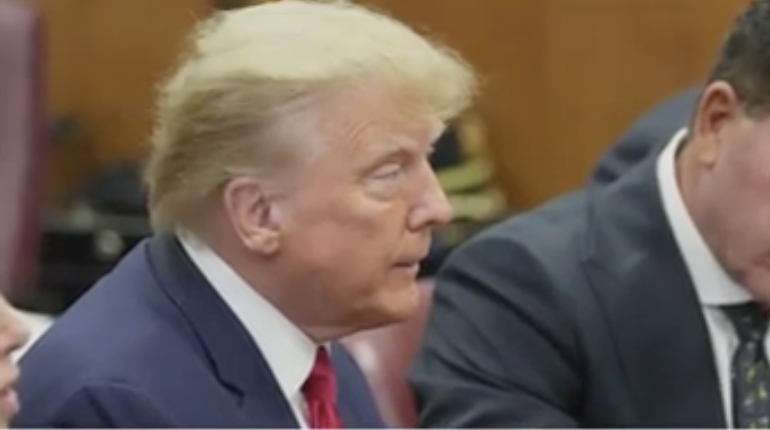By: The Editorial Board – wsj.com – September 4, 2023
You’d think Donald Trump’s opponents would learn. When they fight the former President in the voting booth, they have won every time since they lost with Hillary Clinton in 2016. But when they use lawfare, impeachment or phony collusion claims, they make Mr. Trump stronger.
Here we go again. Now that their indictments have boosted Mr. Trump in the GOP primary polls (see nearby), his opponents are resorting to their worst idea since the panicky agitation of 2017 to remove him via the 25th Amendment. Now they want to invoke Section 3 of the Constitution’s 14th Amendment to disqualify him from the 2024 ballot.
The 14th Amendment is one of the great post-Civil War amendments that enshrined equality under the law. Section 3 was aimed at Confederates who had taken up arms against the Union. Some legal scholars argue that this clause can now be used to disqualify Mr. Trump. They point to the language that says “no person” who has taken an oath to support the U.S. Constitution shall serve in any public office who has “engaged in insurrection or rebellion against the same, or given aid or comfort to the enemies thereof.”
We agree that the disqualification clause has continuing legal force. Its relevance didn’t expire when the last of the Confederates died. What matters today, and in the future, is whether the clause applies to the facts of a specific case. And this is where the never Trumpers go awry—legally and politically.
For starters, they assert that Mr. Trump’s actions after the 2020 election amount to an insurrection and that this is self-evident. Mr. Trump’s behavior was reprehensible, as we noted at the time and have since. But that’s far from saying it was an insurrection or rebellion under the statutory or constitutional meaning of those terms.
The Jan. 6 rally on the Mall turned into a riot at the Capitol. This was an obstruction of a federal proceeding—i.e., the counting of electoral votes. But there have been many riots in American history against U.S. policy that turned violent. The 1970s were rife with them, including bombings of government buildings.
It is surely relevant that Mr. Trump hasn’t been charged with insurrection under 18 U.S.C. Section 2383. Does anyone think special prosecutor Jack Smith would have refrained from charging that crime if he believed he could prove it in court? Instead he has charged a conspiracy to overturn the election, but that is not a rebellion.
An over-broad definition of insurrection and rebellion under Section 3 could easily be abused by political partisans. Already there have been attempts to disqualify from the ballot politicians who supported Mr. Trump’s claims that the 2020 election was stolen. If Section 3 is invoked against Mr. Trump, he won’t be the last target.
All the more so because proponents argue that the disqualification clause is “self-executing,” meaning that it automatically applies to someone who meets the criteria. They say it doesn’t require a criminal conviction in court and can be invoked by state officials to keep Mr. Trump off the ballot. So the Michigan secretary of state, an elected Democrat, could bounce him from that state’s ballot.
This would seem to violate the due-process protections that are explicit elsewhere in the Constitution. Removing Mr. Trump by fiat would also deny voters the constitutional right to vote for the candidate of their choice. See Reynolds v. Sims (1964), among other precedents. This is precisely the right that Mr. Smith, the special prosecutor, accuses Mr. Trump of violating. Democrats would arguably be committing the same offense.
This is how tens of millions of voters would see it, and the fury in response might not be limited to verbal protests or marches. Knocking Mr. Trump off the ballot would validate, in the eyes of his supporters, his claims that the election system is rigged and corrupt.
Advocates of disqualification say not to worry, the judiciary would settle all this after Mr. Trump challenged his disqualification. They say the Supreme Court would have to hear the case, however much the Justices would rather not. That’s probably right but hardly reassuring. This would throw the Court into the middle of the presidential race, jeopardizing the Court’s reputation as apolitical with partisans on one side or the other.
For Mr. Trump’s opponents, these risks are justified because the former President poses a unique threat to U.S. democracy. They’re willing to put democracy at risk in order to save it. But U.S. institutions held up reasonably well despite the strains of the Trump Presidency—even the events of Jan. 6. The transfer of power took place on schedule. Republicans across the government broke with Mr. Trump and supported that transfer. The rioters and organizers are being punished, often severely.
We have argued from the moment Mr. Trump entered the presidential contest in 2015 that the way to defeat him is through the ballot box. Voters will get their chance to do it again next year—first in the primaries and perhaps the general election.
If Mr. Trump does somehow regain the Presidency, in part because Democrats insist on renominating a weak President Biden, the normal U.S. checks and balances will continue to exist. The consequences of a 14th Amendment panic are likely to be worse for democracy and its institutions than trusting voters and 234 years of sturdy constitutional example.
To see this article in its entirety and to subscribe to others like it, please choose to read more.
 Listen Online
Listen Online Watch Online
Watch Online Find a Station in Your Area
Find a Station in Your Area









 Listen Now
Listen Now Watch Online
Watch Online
